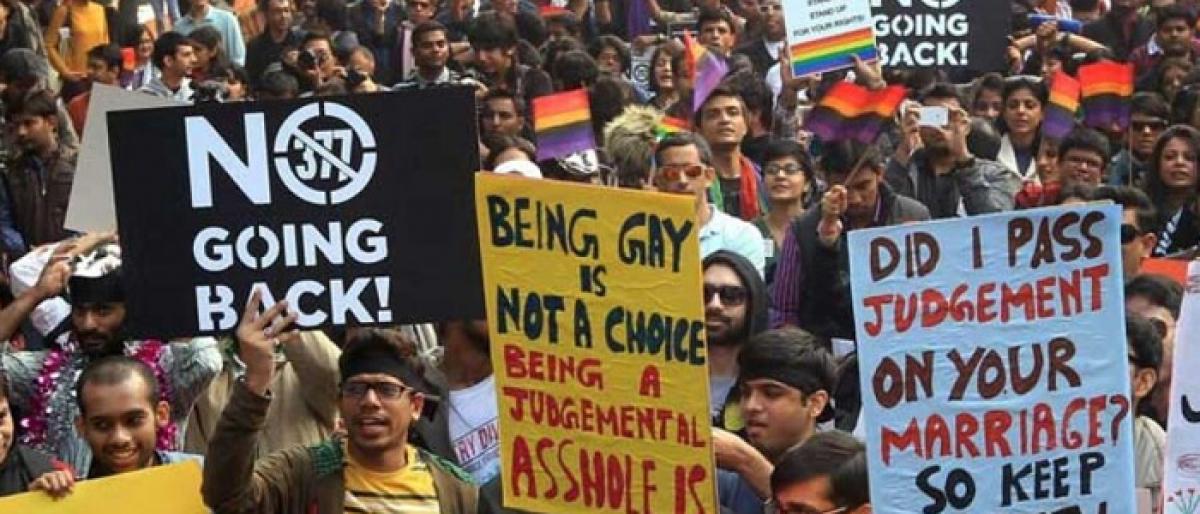Live
- "One Nation, One Election Proposal Undermines Federalism and Democracy," Says Minister Bosaraju
- ‘He is writing history’: Locals elated as PM Modi visits Prayagraj ahead of Mahakumbh
- TGRSA Formed to Revitalize Telangana's Revenue System and Safeguard Employees' Rights
- Days after ED raid, businessman and wife found dead in MP's Sehore
- Central Zone DCP Statement on Allu Arjun's Arrest
- Kinetic Green paves the way for Women’s Empowerment through innovative program and initiatives
- Russia hopes to keep military bases in Syria, Guterres urges deescalation
- ‘Pranayagodari’ review–Riveting village drama
- 6.7 kg Ganja Seized in Mangaluru Anti-Drug Crackdown
- Not only one Atul Subhash, there have been lakhs: PIL in SC on 'false' dowry cases
Just In

Would you be comfortable opening up about your sexual preference, the sexual acts you indulge in? How would you react when your relationship is labelled a crime?
Would you be comfortable opening up about your sexual preference, the sexual acts you indulge in? How would you react when your relationship is labelled a crime?
The LGBTQI (lesbian, gay, bisexual, transgender, queer and intersex) community has been facing these questions for long, battling for their rights, and they are determined to go on till they become India's pride.
According to petitioners challenging Section 377 of the Indian Penal Code, the law which criminalises any sort of homosexual activity, is not only archaic and unreasonable but a "hangover of post-colonial guilt".
June is Pride Month, and the members of the community say they still feel marginalised. They assert India is missing the pink rupee, which describes the purchasing power of the gay community.
"A nation cannot progress if a large number of its population lives in fear or is discriminated against. Section 377 is the hangover of our post-colonial guilt. We have had 70 years to right the wrongs," Keshav Suri, Executive Director, Lalit Suri Hospitality group and a known gay rights activist, told this correspondent.
"We should start taking responsibility for our human rights and ourselves. Today, the LGBTQI community is in millions and we cannot afford for them to be marginalised. India is also missing the pink rupee, which is big money today," Suri added.
In 2009, the Delhi High Court had ruled that Section 377 was unconstitutional. But in December 2013, the Supreme Court overturned the verdict.
There have been fresh pleas seeking to strike down the law. Chef Ritu Dalmia, along with Navtej Johar, Sunil Mehra, Ayesha Kapoor and Aman Nath, filed a petition in the apex court challenging the legal validity of Section 377.
"The ongoing fight is very frustrating but one also has to live with the fact; that's how things work here. Finally, it seems that an end will come soon enough and hopefully a good positive end," Dalmia said.
"Section 377 is a relic of colonial-era Victorian morality that should have no place in a constitutional democracy. These petitioners are asking that the constitutional guarantees of equality, dignity and fraternity be made real for them," a petition lawyer said.
Actress Leena Jumani, who plays a lesbian in the web series "Maya 2", said the government should give the LGBT community the right to choose who to love, and with whom to spend their lives.
Suri pointed out how British Prime Minister Theresa May has apologised for introducing laws that criminalised same-sex relations in India and elsewhere in the former British Empire.
Navtej Singh Johar, a Bharatnatyam exponent, feels now is the time to step out of "archaic" times.
"There is a clarity that this should change. It can no longer continue like this simply because it is so archaic and unreasonable.
In a way, what we are asking for is some kind of a systemic change and it will warrant some degree of heel dragging on the part of the polity. However, I am okay with the dragging because I am hopeful."
Accepting same-sex couples must not be labelled "progressive" as it is a reality that has always existed, he pointed out.
"I find it quite dangerous to accord it the progressive label. Homosexuality does not stand in contrast to our lived culture and history. Creating that binary can be quite dangerous. What is holding us back is that we have so fully bought into the idea of India, an idea that was fabricated in the 19th century while we were on the back-foot and trying to redefine ourselves as per the morality of the coloniser, a Victorian morality to be precise," he said.
"The ironic part is that the incongruity of 377 is glaringly emerging at a time when the regressive and fabricated idea of India is being asserted on a national level," he added.
How can the mindset be changed?
Wipe off the "notion of the other/different", Suri said, and stressed on education.
Besides, Johar says being gay is not an issue as grim as it is presented to be.
"Of course, it influences many people very seriously, even grievously, and we need to recognise that, but 377 is just plain unreasonable... That homosexuality is a crime is just an idea, it is not a reality... It is no one's business if I like oranges more than apples."
The media can have a positive impact on the dialogues which can shape public opinion, says Ayesha Kapoor, who, like other petitioners, is brimming with positivity about driving a change."There is hope and positivity for millions of Indians, including myself," she says.
By: Sugandha Rawal

© 2024 Hyderabad Media House Limited/The Hans India. All rights reserved. Powered by hocalwire.com







